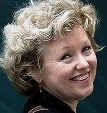 By Kathi Diamant
By Kathi DiamantBefore I wrote my book, Kafka’s Last Love: The Mystery of Dora Diamant, and before it was published in 2003, I thought the tough part was writing the book. And, of course, finding an agent and publisher. I’ve learned otherwise.
As one book publishing expert says, writing the book and getting published is about 10 percent of the job. Selling it is 90 percent.
The sad stark truth is that book publicity and promotion is now the author’s job. The good old days of a publisher organized and financed 40-city book tour, appearances on TV and radio talk shows and bookstore signings are over, unless of course you are a very famous person, a celebrity, politician, billionaire or movie star.
I was once a part of the old machine. As the co-host of morning talk shows in the 1980s, I interviewed authors about their books every day; a third to a half of our guests were authors on tour. Authors were flown to cities across America, where they were picked up and chauffeured to their hotels and appointed appearances by a cadre of locals who specialized in escorting authors on tour. At the end of the interview, I would hold the book to the camera, and tell our audience that the author would be signing her book at Warwick’s or BookWorks.
Seven years ago, when Basic Books published Kafka’s Last Love, they did assign a publicist to me. Knowing how the system used to work, I had high hopes. But I soon discovered that the grand publicity plan they presented me was never implemented. Whether hampered by a lack of budget, experience or intelligence, my publicist did produce a nice one-sheet with the quotes from the good reviews, but that was it. She was unable to book me into a single bookstore outside of San Diego for a talk and signing. When I went rogue, and booked myself in Barnes & Noble in Phoenix and Tucson, she went ballistic. My editor called and ordered me to cease and desist. To let the publicist do her job. “But she isn’t doing it!” I wailed. No matter, it was her job for the first hree months following publication. Then, she was done with me, and moved on to other, newer, books. And I was on my own.
The year before, a canny friend published a book with HarperCollins, and she and her co-author took their entire advance of $15,000 and plunked it down on a professional book publicist, who did a credible job of getting them in the newspapers and bookstores and other appropriate venues for their subject. But I didn’t have $15,000, and few authors do.
So I rolled up my proverbial sleeves, and went back to work, calling bookstores, sending copies and tear sheets, asking for a chance to promote my book. I bought copies of my own book to send to reviewers. I made it my goal to have a book talk at least once a month, even after my book had been on the market for a couple of years. I kept it up for years. Now I have discovered that there are other resources available to us, online, and it is very good news.
Today it’s all about platform. Your writing platform is your visibility as a writer or an expert--the way you reach your potential audience. If you are not a celebrity or movie star or politician, who already have followers, fans and publicity machines, your platform is an essential tool, not only to attract readers but also agents and publishers. It’s your website, blog, speaking engagements, email list, FaceBook page, your position as an expert on your subject. It’s the essential tool to promote yourself and sell your writing. Your writing platform now even determines your chances of selling a book proposal or manuscript to a publishing house.
Last year I attended the first 21st Century Book Marketing Conference in San Diego. By the end of the first day, I was deeply depressed. Everything I had learned about publishing was over, done, passé. But by the end of the second and last day, I was encouraged and educated, armed to march forward into the new era of platforms and online marketing. There’s a second conference planned for September 25 & 26 in San Diego, and I highly recommend it.
I learned that my book is my business, and the web is an author's friend. For example, you must own your URLs for the book—it’s internet real estate. As soon as you have a title, register it! Register your own name. A website is essential for your book. Write a blog (finally getting this requirement going, thanks to San Diego Writing Women). Stay on top of your story—have a Google Alert for each topic you are writing about. Pay attention to breaking news. Offer yourself as a media expert. Have an online press kit that you can send in an instant. Create a YouTube video about your book—make a book trailer, like the movies do.
I’ve been following many of the tips I learned, and it’s paying off. My Google Alert keeps me up to the minute on the news around Franz Kafka, and whenever appropriate I respond with a letter to the editor, or a comment to the writer or blogger. It’s paying off: last week I was quoted in TIME magazine, and was interviewed this week for The New York Times Magazine. Look for it this Sunday!
I’m not sure how many books I’m selling this way (although I know that the NYTimes writer bought one for research) but I know it is keeping my book current and in print, and helping to sell it in other countries (just got an offer from Germany for a German translation.)
The good news is that there is a great deal of good advice and support on how to navigate the new realities of book promotion and publicity. The only tough part is doing it.














